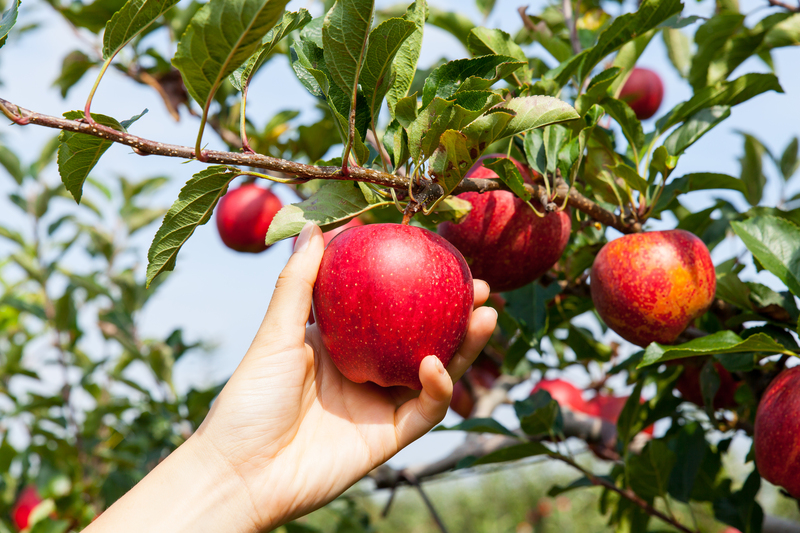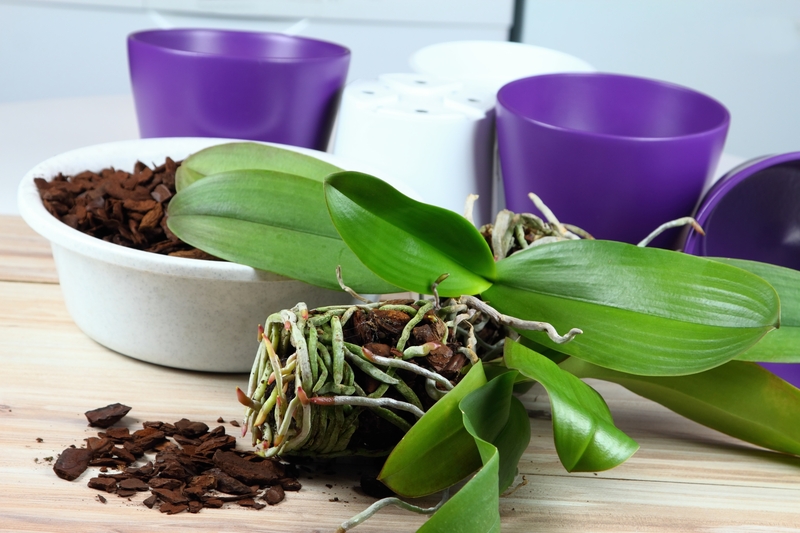Eliminate Weeds with 3 Revolutionary Gardening Tips
Posted on 03/06/2025
Eliminate Weeds with 3 Revolutionary Gardening Tips
Are weeds threatening to overrun your garden paradise? If you've spent countless hours nurturing your plants only to find persistent invaders stealing light, water, and nutrients, it's high time to reclaim your garden beds. Weed elimination is a challenge every gardener faces, but with the right tools and strategies, anyone can create a healthy, thriving outdoor space. In this comprehensive guide, we'll share three revolutionary gardening tips to effectively eliminate weeds and keep your gardens flourishing!

Understanding the Weed Problem in Gardens
Few things are as frustrating as watching weeds pop up between your prized perennials or vegetables. Not only are weeds unsightly, but they also compete for critical resources. Some even attract pests or harbor diseases.
- They steal nutrients: Weeds often have deep, robust roots that outcompete garden plants for minerals and water.
- They spread quickly: A single weed can produce thousands of seeds, spreading rapidly across your yard.
- They can be resilient: Many weeds easily adapt and survive in various conditions, making them tough opponents.
If left unchecked, intrusive weeds can quickly turn beautiful gardens into unruly jungles. That's why eliminating weeds efficiently is so essential for any gardener.
Tip #1: Mulching - Nature's Weed Barrier
Why Mulch Eliminates Weeds
Mulching is far more than just an aesthetic touch for your flower beds. Mulch prevents weeds by forming a dense barrier between weed seeds and sunlight, one of the critical elements required for weed germination and growth.
- Suppresses Sunlight: Without sunlight, weed seeds struggle to germinate or sprout.
- Conserves Moisture: Not just great for your plants, mulch helps your soil retain moisture by reducing evaporation.
- Improves Soil Health: Organic mulch breaks down over time, adding nutrients to the soil and supporting beneficial organisms.
In other words, mulching for weed control is a win-win strategy. Here's how you can maximize this revolutionary gardening tip:
How to Mulch for Optimal Weed Prevention
- Choose the right mulch: Organic mulches like wood chips, straw, grass clippings, or shredded bark are excellent choices. Inorganic mulches such as landscape fabric or pebbles work well in paths and patios.
- Apply a thick layer: Spread mulch in a 2-4 inch layer for effective weed suppression. Too thin, and weeds may poke through; too thick, and you could suffocate desirable plants.
- Maintain it regularly: Replenish mulch yearly and pull any stray weeds that appear before they become established.
Tip: Avoid piling mulch too close to plant stems. Leave a small gap to prevent rot and encourage air circulation.
By integrating mulching to eliminate weeds into your routine, you create a hostile environment for weeds and a nurturing haven for your plants.
Tip #2: Smart Planting and Garden Design
Dense Planting: Outsmarting Weeds
Did you know that your garden design itself can be one of your greatest allies against unwanted weeds? The way you space and combine your plants can dramatically reduce weed outbreaks.
- Dense plantings create shade: Flowerbeds and vegetable rows packed with beneficial plants leave little room or sunlight for weed growth.
- Ground covers choke out weeds: Certain low-growing, spreading plants like creeping thyme, clover, or vinca can blanket the soil, smothering emerging weeds.
How to Plant for Weed Suppression
- Choose quick-growing annuals: Fast germinating and spreading varieties fill empty spaces faster and inhibit weed seed establishment.
- Layer your garden: Use ground covers, mid-height fillers, and taller plants in a tiered fashion to maximize soil coverage.
- Interplant crops: In vegetable gardens, alternate rows of fast-growing and slow-growing plants to prevent weedy gaps.
Pro tip: Group plants with similar light and moisture needs together. This maximizes plant health, minimizes bare soil, and keeps weeds at bay.
By embracing dense planting and strategic layering, you can reduce the labor needed for weed elimination while boosting the vibrancy and resilience of your garden.
Tip #3: Targeted & Eco-Friendly Weed Removal Techniques
Innovative Methods to Eliminate Weeds
For especially persistent weeds that break through mulch or plant covers, direct intervention is sometimes necessary. However, reaching for chemicals can be harmful to pollinators and your garden ecosystem. That's why innovative, eco-friendly solutions are revolutionizing how gardeners handle weeds.
Mechanical and Manual Tools
- Weed flamers: These devices use focused heat to wilt and kill weeds without disturbing the soil. Ideal for gravel paths or tough-to-pull weeds.
- Precision hoes: Modern ergonomic hoes or stirrup hoes allow for quick, efficient weed slicing just below the soil surface, preventing regrowth.
- Weed pullers: Innovative weeding tools grab roots deeply, ensuring complete removal, particularly for dandelions and tap-rooted weeds.
Organic Weed Solutions
- Boiling water: A time-tested method, pouring boiling water on weeds in driveways or paths will cook them instantly without chemicals.
- Homemade vinegar sprays: Combine vinegar, a small amount of salt, and a drop of dish soap for an effective spot treatment (be careful near desired plants, as this kills indiscriminately).
Caution: Always target only the weeds with non-selective treatments like boiling water or vinegar. These methods work best on young, actively growing weeds.
Solarization: Harness the Sun
Another revolutionary approach to eliminate weeds from garden plots is solarization. This method involves covering the soil with clear plastic during hot summer months, trapping heat and literally cooking weed seeds and pathogens in the upper soil layer. Within a few weeks, the garden plot is weed-free and ready for planting!
- Ideal for new beds: Best used when preparing new garden plots or reclaiming severely overgrown areas.
- Non-toxic: No chemicals required! Solarization is eco-friendly and highly effective.
By combining these eco-friendly removal techniques with smart prevention, your garden will remain healthy and weed-free throughout the growing season.
Bonus Tips: Long-Term Weed Prevention Strategies
1. Consistent Garden Maintenance
- Regularly check for weeds: Early removal is less work and reduces future problems.
- Deadhead flowers: Prevent self-seeding by removing spent blooms before they drop seeds.
2. Maintain Healthy Soil
- Fertilize and compost: Rich, healthy soil boosts plant vigor, helping them outcompete weeds naturally.
- Rotate crops: Changing planting locations disrupts weed cycles and pathogen buildup.
3. Edge and Border Installations
- Physical barriers: Steel, plastic, or stone edging contains aggressive weed runners and prevents encroachment from lawns.
Combining the 3 revolutionary gardening tips above with ongoing good practices creates an integrated weed management system that will keep your garden beautiful, productive, and requiring less work each year.
Common Weed Myths Debunked
1. "Pulling Weeds is Bad for Your Back"
With new ergonomic weeding tools and techniques like kneeling or sitting on garden stools, you can eliminate weeds without pain. Regular spot maintenance stops weeds from getting out of hand.
2. "Weed Killers Are the Only Solution"
While chemical herbicides can work, they're often hazardous to children, pets, pollinators, and even the soil itself. The revolutionary tips discussed here show that eco-friendly, safe weed elimination is absolutely possible.
3. "Mulch Attracts Bugs"
Organic mulch does attract beneficial soil critters! However, if spread properly and kept away from stems, it won't harbor unwanted pests, and it greatly aids weed prevention.

Frequently Asked Questions: Weed Elimination
What is the most effective way to eliminate weeds in my garden?
A combination of mulching, dense planting, and targeted removal has proven to be the most effective and sustainable method for long-term weed control.
Is vinegar safe for vegetable gardens?
Vinegar can harm any plant it touches, so use it with caution. Apply only to visible weeds, avoiding spray drift onto vegetables or ornamentals.
How often should I mulch for weed prevention?
Typically, mulch should be topped up or refreshed once a year, usually in spring or fall. Remove any patches of mold or decay before adding new layers.
Are homemade weed killers as effective as commercial ones?
While commercial herbicides often work faster, homemade solutions like boiling water or vinegar are safer for the environment and work well for small, targeted weed outbreaks.
Conclusion: Revolutionize Your Garden by Eliminating Weeds
Dealing with weeds doesn't have to mean endless work or resorting to harsh chemicals. By embracing these three revolutionary gardening tips--mulching, smart planting, and targeted eco-friendly removal--you can eliminate weeds naturally, protect your prized plants, and enjoy a vibrant, healthy garden season after season.
- Use thick layers of organic or inorganic mulch to choke out weed growth.
- Design your garden for dense plant coverage to outcompete unwanted invaders.
- Adopt innovative, eco-safe removal techniques for those stubborn weeds that break through.
Begin your journey to a weed-free, beautiful garden today. With these disruptive, effective strategies, you'll spend less time fighting weeds--and more time enjoying your perfect green space!

